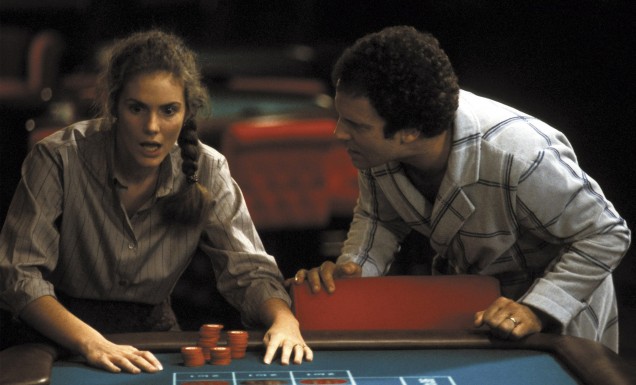Lost in America
comedy, USA, 1985
DIRECTED BY: Albert Brooks

CAST:
Albert Brooks (David Howard),
Julie Hagerty (Linda Howard),
Sylvia Farrel (Receptionist)
SCRIPT:
Albert Brooks,
Monica Johnson
PHOTOGRAPHY:
Eric Saarinen
MUSIC:
Arthur B. Rubinstein
EDITING:
David Finfer
Synopsis:
A typical American suburb in the mid-80s of the last century. After missing out on the expected promotion, young marketing expert David Howard quits his job at the agency where he had been working in disappointment. Encouraged by this, he concludes that both he and his wife Linda are tired of the certainly comfortable, but also monotonous and empty everyday life in a supposedly idyllic environment, and manages to persuade his "better half" to sell all their property and the crane to travel across America. Both of them are driven by the desire to see and get to know the USA better, and they decide to start their journey and new life in Las Vegas, where they get married again. Ironically, the new entry into the old marriage will soon prove to be the beginning of the end of their previously very harmonious marital relationship. Not only will Linda lose all of their family savings at the desert casino roulette, but they will both almost perish at the Hoover Dam. Then they will accept doing physical jobs in the conservative provincial town of Safford, Arizona, David in an elementary school and Linda in a fast food restaurant, believing that this will help them recover a little and get back on their feet. They have no idea, however, that their troubles will not end there yet.
The satirical comedy of the co-writer, director and main actor Albert Brooks is an intelligently conceived, dynamic, safely directed and extremely entertaining production whose protagonists are a couple of young yuppies caught up in the crisis of monotonous life and early middle age. The film, which Albert Brooks, who three years later will be nominated for an Oscar for his supporting role in James L. Brooks' excellent drama Television News, signs as a complete author, deals with the subject of the troubles of the upper middle class in a smart, witty and rather charming way. In related works from the 80s, such as the comedy 9 to 5 by Colin Higgins, the romantic comedy drama Working Girl by Mike Nichols, the fantasy comedy How to Succeed in Advertising by Bruce Robinson, the horror Cujo by Lewis Teague based on the novel by Stephen King, and the crime drama Wall Oliver Stone's Street, neurotic marketers and the advertising industry as such, or in general ´white collars´ from the office and pleasant suburbia, were frequent targets of comedic, satirical, thriller and horror depictions of alienation and loss that prevail in American society. The messages were always simple and clear - everyone sometimes has to accept a risk and even lose his job in order to find the meaning of life and his own soul, otherwise he is threatened with ruin and destruction. In this sense, this film works harmoniously and unobtrusively on the conceptual level, Brooks' film personality as a spoiled and neurotic urban yuppie is presented with a touch of self-irony because he mocks himself, which makes him acceptable to the middle class, and compared to similar works by Woody Allen, the level of his wit is at least equal and maybe even higher, and it often seems less forced. In the subtext, Brooks deals with the motives of greed, hedonism and panic rather intriguingly, which makes it easy to understand the motivations and actions of his characters.
color, 91